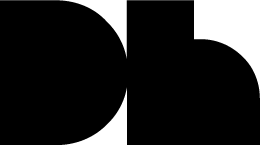It all started with a cocktail napkin. More than 25 years ago, Jim and Cher Desautel were having drinks at the Elkins Resort on Priest Lake in Idaho, when they began scribbling down the traits of the ideal communications firm.
It needed to be adaptable.
It needed to be equitable.
And, most of all, it needed to be driven by passionate people.
Jim was working in the public sector, Cher was working in the private sector. As communicators and entrepreneurs, they knew their experience and their vision could bring a much-needed sense of humanity and vibrancy to the Inland Northwest’s communications landscape.
This brainstorming session led to them founding DH, then known as Desautel Communications and Marketing, in 1996. After partnering with Avista Utilities and the Kalispel Tribe as some of their first clients, Jim and Cher started expanding. Their first three employees, Michelle Hege, Sara Johnston and Andrei Mylroie are three of the four partners who, together with Christine Varela, now lead DH.
Since Jim and Cher retired from the company in the early 2010s, DH has continued to evolve and grow, but with the founders’ core principles still at the heart of the business. As DH is set to celebrate its 25th anniversary in November, the Desautels reflected on the pleasures and challenges of launching the firm, and how their original ideas, once merely scribbles on a paper square, are driving the company to this day.
Here are a few of Jim and Cher’s key observations and pieces of advice.
Integrated marketing is more important than ever.
The concept of integrated marketing isn’t a new one, of course, but when Jim and Cher founded DH, it wasn’t exactly a term on everyone’s lips.
But it soon became the foundation for DH’s work, not only with clients but within the agency, creating a unified message across marketing channels and embracing a collaborative and interdisciplinary work environment. Although integrated marketing wasn’t a specific tenet of the original DH business model, it was always inherent in its core values and became an essential part of the firm as it grew.
“Right from the beginning, everybody had strengths and things they were really passionate about,” Cher recalls. “We were all interested in the academic models and how they could be adapted. But mostly, we were just out there serving the clients and trying to get them results. You build on what you know.”
The values of integrated marketing were also perfectly compatible with the even playing field that is the DH workspace: It’s important, the Desautels say, to let everyone in the firm have a voice. That, in turn, makes the deliverable work more consistent and more successful.
“Not only did we all need to work together, live together and thrive together, but we weren’t in competition with each other,” Cher says. “There was enough room for everybody. Everybody could have a voice. Everybody has things that are important to them and want to feel listened to.”
“We came forward with that intention, and it has served us well. And it has legs. The team now can carry that forward and add to it beyond our wildest dreams.”
It’s all about serving the underserved.
The importance of diversity and social equity in marketing has become more and more pronounced in the last couple decades, and DH was a pioneer in the field.
DH was the first Inland Northwest communications agency to work closely with the region’s Native American tribes and its casinos as clients, something that is still a source of pride for Jim, a member of the Colville Confederated Tribes.
“My goal was to start showing tribes as our neighbors and our friends,” Jim says. “These aren’t just casinos. These are community members. These are community supporters. These are community providers.”
As more and more agencies push practices of diversity, equity and inclusion to the top of their priority lists, it’s not enough to merely adopt a DEI ethos, the Desautels say: Organizations need to recognize that many cultural and social systems are built unfairly, and let that reflect in their work.
“The only way we can move forward is to acknowledge the trauma of the past, and the way many systems were built, but also be hopeful and optimistic and take the best of what’s out there,” Cher says. “For organizations developing a DEI statement, that’s just the beginning. You’ve got to live with it and build on it and make sure it’s in the hearts and minds of your people.”
DH is still driven by Jim & Cher’s founding values.
DH was founded on the notion of zealotry — the firm would not only commit wholeheartedly to its clients, but become full-throated advocates for their missions, values and visions. Those ideals are still a key part of DH’s business model, which aims to empower people, causes and organizations in order to create positive change in society.
All that originates from Jim and Cher. They’re careful to note that an employee can only be a true zealot if they feel their voice is heard, and that their viewpoint is as valuable as any of their coworkers, regardless of seniority.
“Letting people have their lives and their passions is important,” Cher says. “We go out of our way to have people be healthy in the workplace, and play to their strengths.”
“A company has to continue to unleash its ability and its power,” Jim says, adding that a firm is only as successful as the people it chooses to represent it. “If you hire well, you can do a lot of good things. And I always bragged that I hired well.”
Looking to the future.
As DH closes out its first quarter century, the agency’s staff is 10 times what it was in the beginning, and its work has morphed and evolved right alongside our increasingly hyperconnected world. Yet the principles and value systems that were first scratched out on the Desautels’ napkin remain in place, and the founders hope DH’s best, most productive years are still ahead of it.
“25 years is a lot in life, but it’s pretty young for a firm,” Cher says. “In terms of scale, ability and passion and talent, larger firms really don’t have anything on DH.”

